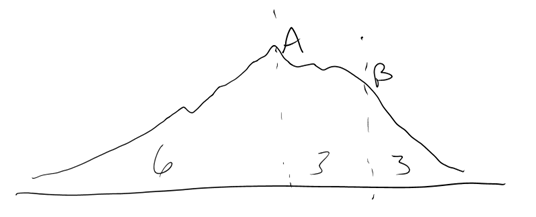A really cheap estimate
One of the questions I was asked to answer this week was, “When do you estimate you will be done with ‘Project Caribou?’”
There are a number of techniques I could use to answer this, and I have written about a few different models I have used in the past. For this answer, I needed to come up with a result very quickly and I fell back to a very simple modeling technique.
What I did was compare where we are in a ship cycle now to past ship cycles, and use that to determine how much work was left.
So imagine this graph represents time along the bottom, and the mountain is the work:
Point A is supposed to represent the halfway point (sorry for my drawing). It took, in this example, 6 weeks to get here, and since it is halfway, there are 6 weeks of work left. Point B is a little farther along – it represents being 3 weeks from halfway done, and there are 3 weeks left.
Assuming the workload is about the same for this previous task, and assuming I can estimate about how far we are along Project Caribou, I can use this to determine how much time we have left before we are done. If we are taking on more work items than we are completing, I am probably to the left of A. If the amount of work items we are taking on is equal to the amount we are completing each week, I can estimate we are near A and are about halfway done.
In the case I had, I saw that we were finally completing slightly more tasks each week than we were taking on, so I knew we were to the right of A. I did not have time for more analysis, so I picked the point midway between A and being done, which in this example gave me an estimate of 3 weeks of work left.
Accurate? Not very. There are key assumptions about the work I mentioned above that may not be true. Also, I arbitrarily picked a mid point to represent where we are now.
Better than a wild guess? Yes, I think so. This uses past experiences that, at some level, represent the current situation. It’s better than a random guess and at least provides a rough starting point for planning.
Ideally, I would want several models and data sources in order to make more estimates and increase my accuracy, but for a 2 minute conversation, this works better than random guesses since it is somewhat data based.
And the big key to any estimate is that any data always leads to a better estimate than no data.
Questions, comments, concerns and criticisms always welcome,
John
